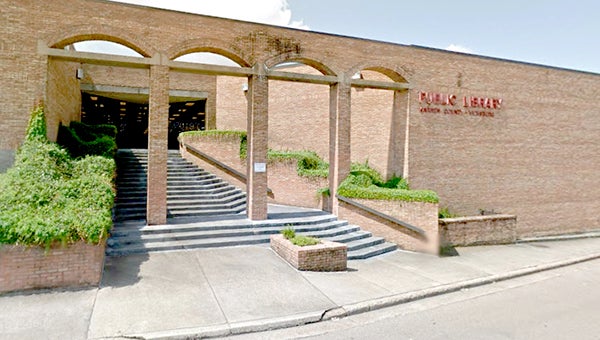On The Shelf: The past comes alive with new historical fiction titles
Published 8:00 am Sunday, September 3, 2023
This column was submitted by Evangeline Cessna, Local History Librarian at the Warren County-Vicksburg Public Library.
These historical fiction titles can be found in the New Adult Fiction collection.
First, we have “The First Ladies” by Marie Benedict, which chronicles the partnership between First Lady Eleanor Roosevelt and civil rights activist Mary McLeod Bethune. Bethune is the daughter of formerly enslaved parents who refused to back down as white supremacists attempted to thwart her work. She marches as an activist and an educator. Roosevelt is herself in awe of Bethune and eager to make her acquaintance. They bond over their shared belief in women’s rights and the power of education. They confide their secrets, hopes and dreams with one another and hold each other’s hands through tragedy and victory. When Franklin Roosevelt was elected President, the two began to collaborate more closely. Eleanor becomes a target because of her outspokenness, especially on civil rights. When she is threatened because of her strong ties to Bethune, it only fuels the women’s desire to fight for justice and equality. These two different, yet equally formidable, passionate and committed women, demonstrate a singular friendship that helped to form the foundation for the modern civil rights movement.
In “The Paris Assignment” by Rhys Bowen, a courageous wife, mother and resister confronts the devastation of World War II. Madeleine Grant is a Londoner studying at the Sorbonne in Paris when she marries French journalist Giles Martin. As they are raising their son, Olivier, the thunder of war sets off alarms in France. Giles sends Madeleine and Olivier to the tenuous safety of England. There, Madeleine secures a job teaching French at a secondary school. A cruel twist of fate results in the loss of her son and Madeleine accepts a request from the ministry to aid in the war effort. When she returns to France, she seizes on the opportunity to find Giles alive. Her perseverance, defiance and heart will be tested beyond imagining, but no risk is too great for a brave wife and mother determined to fight and survive against extraordinary odds.
“Canary Girls” is a lively and informative novel about the “munitionettes” who built bombs in Britain’s arsenals during World War I. Early in the war, men left Britain’s factories in droves to enlist in the armed services. In order to keep up with production, arsenals hired women to build the weapons the military desperately needed. Recruitment posters read: “Be the Girl Behind the Man Behind the Gun.” Thousands of women from all walks answered their nation’s call. They worked grueling shifts seven days a week. They handled TNT and other explosives with little protective gear. Former housemaid April Tipton takes a job at Thornshire Arsenal near London, filling shells — difficult, dangerous and essential work. Joining the women is Lucy Dempsey, wife of Olympic gold medalist Daniel Dempsey. Lucy’s coworkers learn she is a footballer’s wife and invite her to join the Arsenal ladies’ football club, the Thornshire Canaries. The ladies have acquired the nickname “canary girls” for the lurid yellow hue of their skin they acquired from handling the chemicals in the factory. As the war plods on and tragedy begins to take its toll, the Canary Girls persist despite the dangers, proud to serve, determined to outlive the war and rejoice in victory and peace.
James McBride’s newest novel, “The Heaven & Earth Grocery Store,” is about small-town secrets and the people who keep them. In 1972, workers in Pottstown, Pennsylvania were digging a foundation for a new development when they find a skeleton at the bottom of a well. Who the skeleton was and how it got there are long-held secrets kept by the residents of Chicken Hill. Chicken Hill is the dilapidated neighborhood where immigrant Jews and African Americans lived side by side. Moshe and Chona Ludlow lived in Chicken Hill. Moshe integrated his theater and Chona ran the Heaven & Earth Grocery Store. When the state came looking for a deaf boy to institutionalize him, Chona and Nate Timblin — the black janitor at Moshe’s theater — worked to keep the boy safe. When the truth is finally revealed about the skeleton of Chicken Hill, the secrets of the town’s dark past will come to light.
“The Beach at Summerly” by Beatriz Williams takes readers back to the secrets and Cold War intrigue of mid-century New England. In June 1946, Winthrop Island prepares for the first summer season after the sacrifice of war, a glamorous new figure moves into the guest cottage at Summerly, the idyllic seaside estate of the wealthy Peabody family. Emilia Winthrop is the daughter of Summerly’s year-round caretaker and a descendant of the island’s settlers. She spent the war years caring for her incapacitated mother. Olive Rainsford, however, spent the war years traveling the world, marrying fascinating men and involving herself in political causes. Rainsford is also the beloved aunt of the two surviving Peabody sons, Amory and Shep, with whom Winthrop has a convoluted romantic history. The women develop a deep rapport and Rainsford encourages the younger woman to leave the island, see more of the world and have her own adventures. As Winthrop is developing feelings for the steadfast Shep Peabody, an FBI agent arrives and demands that she help to capture a Soviet agent who has been transmitting vital intelligence on the West’s atomic weapon program from somewhere inside the Summerly estate. The events that follow will rip the Peabody clan apart and leave Winthrop Emilia yearning for redemption.
James Lee Burke sets his new novel “Flags on the Bayou” in Civil War-era Louisiana. In the fall of 1863, the Union army had control of the Mississippi river and much of Louisiana, including New Orleans and Baton Rouge was occupied. As the Confederate army retreats toward Texas, they are replaced by Red Lags, irregulars commanded by a maniacal leader and enslaved men and women who are seeing the first glimpses of their freedom. When Hannah Laveau, an enslaved woman, is accused of murder, she goes on the run with an abolitionist schoolteacher named Florence Milton. The two dodge the local constable and the slavecatchers on the prowl in the bayous. Wade Lufkin returns to his uncle’s plantation to convalesce and try to put the horrors of his time as a surgeon on the battlefield behind him. While there, he becomes enamored with Hannah and their blossoming romance is interrupted by skirmishes with Confederate irregulars led by a diseased and deranged colonel.



